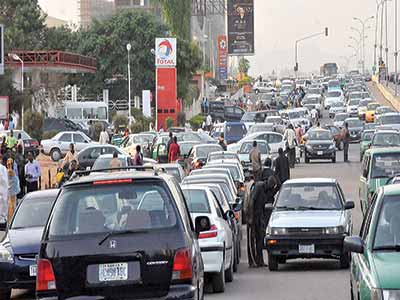
FUEL scarcity continued in many states in the country yesterday with more filling stations shutting down to customers as petroleum marketers await sovereign debt notes.
Besides, the Federal Government’s subsidy per litre of fuel has dropped to N6.03k, the lowest in many years, according to the pricing template of the Petroleum Products Pricing Regulatory Agency (PPPRA).
Though the Federal Government said last week that fuel scarcity would be over in days, as at yesterday, a sizeable number of the stations in Lagos remained under lock and key.
The Minister of Information and Culture, Lai Mohammed, had last week, assured that the fuel scarcity in the country would be over in a matter of days, following the approval of the subsidy payment by the National Assembly.
The minister had explained that the N521 billion approved by the National Assembly, as part of the supplementary budget of N574.4 billion, would be enough to cover the fuel subsidy till the end of the year.
But a top petroleum marketer told The Guardian that they were yet to get the subsidy payment. The marketer said: “Subsidy supplementary budget has been approved but marketers await Debt Management Office (DMO) invitation to collect Sovereign Debt Notes.”
As at yesterday, there were long queues of vehicles at few petrol stations within the Federal Capital Territory (FCT) that are dispensing fuel.
Consumers had to wait for several hours before they could get close to the dispensing pumps while other motorists who did not have the patience to queue resulted to buying from fuel hawkers who took over the streets of Abuja making brisk business.
Due to the scarcity of fuel, fares have gone up across the country, most especially in Lagos, Abuja and Anambra states. The fare from Oshodi to Obalende, which used to be N100, has gone up by 100 per cent to N200 per passenger.
The Guardian learnt that the fare from Awka to Onitsha, which used to be N200, has increased to N350, while the cost of a journey from Onitsha to Enugu has increased from N300 to N600. Also, those travelling from Awka to Abuja and Lagos now pay N8,000, as against N3,500 paid previously on Toyota Siena.
Meanwhile, the PPPRA said in its latest pricing template released yesterday that subsidy on a litre of fuel had dropped to N6.03k.
According to the agency, the landing cost of fuel has dropped to N77.54k per litre while expected open market price of fuel stands at N93.03 per litre.
Bringing a long-term solution to the fuel crisis, the Minister of State for Petroleum, Dr. Ibe Kachikwu, said that in the next 24 months, Nigerians would see a positive dramatic turn in the refinery model in the country .He stressed that going forward, the new refinery model that would be introduced would not only meet the petroleum products need of the country but that of the West African sub-region.
“The new model is that refineries would now buy their own crude oil, refine it and make remittances to the Federal Account Allocation Committee (FAAC). They would operate a semi-autonomy system that would enable them to run in a profitable manner,” Kachikwu said.



